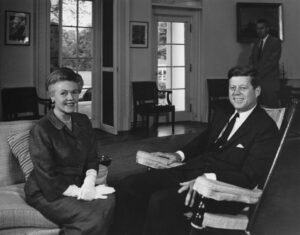Helen Eugenie Moore Anderson, called Eugenie, was born in 1909 in Adair, Iowa. She studied at Stephens College in Columbia Missouri, and then at Simpson College in Indianola, Iowa. In 1929 she transferred to Carleton College in Northfield, Minnesota, where she met and married John Pierce Anderson. In 1930, they moved to New York City where Eugenie enrolled at the Institute of Musical Art.
In 1937 Anderson traveled to Europe, where she witnessed “a group of uniformed five-year-old boys stepping in lock step.” She was so moved by the rise of fascism in Germany that she returned to the United States determined to advocate for diplomacy and democracy. She began studying global and domestic issues, and joined the League of Women Voters in 1938.
Anderson was fiercely anti-communist and anti-isolationist, and helped to establish the Democratic Farmer Labor Party (DFL) of Minnesota. She became a Democratic national committeewoman in 1948, and later the Minnesota delegate-at-large to the national Democratic convention.

In 1949, Anderson became the first American woman to be an ambassador when President Harry S Truman appointed her to be ambassador to Denmark. During that time she traveled and lectured throughout Western Europe, India, and the United States, as both a private citizen and official representative for various governments. In 1962, President John F Kennedy named her minister to Bulgaria. She served in this post until December 1964.
Beginning in 1965, Anderson served as a member of the U.S. delegation to the United Nations, making her the first woman to sit on the Security Council.
Throughout her career, Anderson was committed to people-to-people diplomacy, placing special emphasis on direct citizen engagement.















